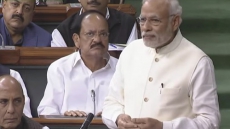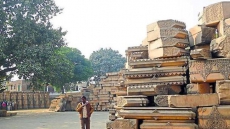On Tuesday, the fifth day of hearing in the Ayodhya case at the Supreme Court, Hindus submitted that a temple was destroyed and a mosque was built over it. Such an act couldn't deprive the deity and the temple of the ownership of the place, they said.
Though the Muslim parties objected to the proceedings, the court brushed aside their opposition.
Advocate C.S. Vaidyanathan, appearing for deity Ram Lalla Virajman, cited the Allahabad High Court judgement where a judge restricted the Lord Ram's birthplace to the central dome of the mosque and, through a map identified the circular path for 'parikrama' by devotees to complete their worship. Therefore, the area under the 'parikrama' also became a place of the deity, Vaidyanathan submitted.
"The three-judge Bench of the Allahabad HC also held that there was a temple at the disputed area. Justice S.U. Khan had identified that mosque was built on the temple's ruins. Therefore, the mosque was not built on the vacant land", submitted Vaidyanathan.
Drawing an inference for his arguments, Vaidyanathan said if judges had concurred that there was a temple before the mosque, then the deity's possession right should be accepted. As the deity was never alienated from the property, there could not be adverse possession of it, he argued.
Justice D Y Chandrachud, one of the judges of the Constitution Bench headed by Chief Justice Ranjan Gogoi, queried Vaidyanathan, how would the court proceed in the light of the Allahabad HC verdict, which favoured joint possession of both parties?
To this Vaidyanathan submitted the ouster of the Hindu deity from the site was never established. Neither was established the exclusive possession of the Muslim side. Therefore, it's logical to say those who offered prayers from the time immemorial should retain their rights. Muslim couldn't present any document to show their ownership, thus how could they establish adverse possession, he said.
Justice Ashok Bhushan then intervened saying the Muslim side has claimed exclusive possession of the site. When Vaidyanathan argued the high court didn't accept that, the judge quipped: "We don't have to go just by the findings of the high court."
CJI Gogoi also asked Vaidyanathan to answer how Ram Lala Virajman established its exclusive title while countering the suit by the Sunni Waqf Board.
The counsel argued a place could also be considered a deity by virtue of belief by millions, and it's the divinity of the deity. Vaidyanathan also cited the Supreme Court judgment to claim presence of idol was not the sole condition for existence of a temple. "If people believe in its religious worth, the condition is automatically met," contended Vaidyanathan.
K Parasaran, also appearing for Ram Lalla Virajman, concluding his arguments submitted that the court must deliver complete justice in all the matter before it.
Rajeev Dhavan, appearing for a Muslim party, objected to the line of argument by the Hindu parties and informed the court he didn't favour the way the proceedings were being carried out.
Dhavan said lawyers from the Hindu side had not exhibited anything yet, rather than reading out from the Allahabad HC judgement. "This is a case of hop, skip and jump. No exhibit or evidence has been placed yet. In fact, most citations was not admitted by the HC", argued Dhavan.
When the Chief Justice said the Muslim parties would get their time, Dhavan replied, "I hope you do". To that the Chief Justice told Dhavan that from day one he had been making snide remarks at the Bench. Let it be loud and clear to all counsel appearing in the matter, we were not in hurry and they could take as much time as possible, the Bench said.
Ram Lalla Virajman's counsel also presented P. Carnegie's historical sketches on the importance of Ayodhya along with the British administration orders.
Vaidyanathan read out the gazetteer notices in 1850s to show that though complaints were lodged regarding the inner courtyard's construction, nothing was removed and that included the Chabutara. Therefore, everything continued. "The British wanted everything to remain undisturbed," said Vaidyanathan and added the deity predated the mosque.
When Justice S.A. Bobde asked Vaidyanathan, "You are saying the deity can't be partitioned," Vaidyanathan replied in affirmative. "There can't be any division of the deity. If the place belongs to deity, then the construction of mosque can't change the status of deity," he argued.
The hearing will continue on Wednesday.
Against the 2010 Allahabad HC verdict, nearly 14 appeals have been filed in the apex court. The HC through its judgement, in four civil suits, partitioned the 2.77-acre land equally among the three parties -- the Sunni Waqf Board, the Nirmohi Akhara and Ram Lalla.


